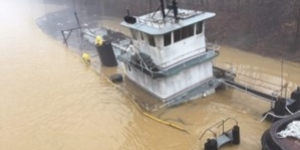Blog Post
Environmental Crimes Bulletin October 2023 Week 3
In this issue:
- United States v. Erik Armando Ramos, et al., Nos. 2:21-CR-00354, 22-CR-00592 (C.D. Calif.), former AUSA Amanda Bettinelli
- United States v. Diesel Freak, LLC, et al., Nos. 1:23-CR-00048, 1:23-CR-00050 (W.D. Mich.), AUSAs Justin Presant and Meagan Johnson
- United States v. Pedro Huertas, No. 2:23-CR-00104 (D. Vt.), AUSA Joseph Perella with assistance from ECS Senior Counsel Elinor Colbourn
- United States v. Miguel Marcial Amaro, No. 2:23-CR-00423 (E.D. Pa.), United States v. Martin Ramos, No. 2:23-CR-00424 (E.D. Pa.), ECS Senior Trial Attorney Dan Dooher, ECS Trial Attorney Rachel Roberts, AUSA Joan Burnes, and ECS Law Clerk Nate Borrelli
- United States v. Carl Fioravanti, No. 1:23-CR-00555 (N.D. Ill.), AUSAs Sean Franzblau, Kirsten Moran, and Brian Netols
United States v. Erik Armando Ramos, et al., Nos. 2:21-CR-00354, 22-CR-00592 (C.D. Calif.), former AUSA Amanda Bettinelli
On October 16, 2023, a court sentenced Erik Armando Ramos to six months incarceration, followed by three years’ supervised release. Ramos pleaded guilty to transporting explosives without a license (18 U.S.C. § 842(a)(3)(A)).
Between April and June 2021, Ramos and co-defendant Arturo Ceja purchased commercial-grade fireworks and homemade explosives from Nevada and other states, transporting them to California in U-Haul trucks. Ceja planned to sell the fireworks throughout his neighborhood, despite not possessing a license or permit to transport explosives. Ceja purchased the commercial-grade fireworks from “Area 51” and “Black Jack Fireworks” (both wholesale dealers located in Pahrump, Nevada) using the customer name “Autron.” Sales invoices, receipts, and surveillance footage from a fireworks wholesaler in Nevada proved that Ramos and Ceja shared the cost of the purchases, communicated constantly by cell phone, loaded the U-Haul rental truck, and shared a customer account to obtain a discount for bulk purchases.
Responding to a tip on June 30, 2021, Los Angeles police found more than 32,000 pounds of fireworks stored at Ceja’s residence, which was located in a densely populated neighborhood in South Los Angeles. Ceja stored some of the explosives near a gas grill.
While attempting to safely destroy the homemade fireworks, the bomb squad accidentally blew up the armored containment vehicle (ACV) they routinely use to safely detonate explosives. The LAPD bomb squad packed nearly 40 pounds of explosives (which included M100s, M3000s, and a mortar covered in tin foil) into an ACV that was only rated for 33 pounds.
The explosion caused debris to rain down on scores of residences, businesses, and vehicles. Authorities transported 17 individuals (including residents and first responders) to local hospitals. The explosion displaced dozens of people.
Following the ACV explosion, Ceja pleaded guilty to transporting explosives (namely flash powder) without a license (18 U.S.C. § 842(a)(3)(A)). Ceja was sentenced in October 2022 to five months’ incarceration, followed by two years’ supervised release.
The Los Angeles Police Department; the Bureau of Alcohol, Tobacco, Firearms, and Explosives; and the Department of Transportation Office of Inspector General conducted the investigation.
United States v. Diesel Freak, LLC, et al., Nos. 1:23-CR-00048, 1:23-CR-00050 (W.D. Mich.), AUSAs Justin Presant and Meagan Johnson
On October 17, 2023, a court sentenced two companies and several individuals for violating the Clean Air Act by engaging in an aftermarket scheme to disable the emissions control systems of semi-trucks (18 U.S.C. § 371). Accurate Truck Service, LLC, and Griffin Transportation, Inc., will pay a combined maximum fine of $1 million ($500,000 each) and serve a year of probation. The owners of these businesses, Craig Scholten and Ryan Bos, will each pay $6,000 fines and complete one-year terms of probation to include four-months’ home detention. Douglas Larsen was fined $7,500 and sentenced to two-months’ home detention as part of a one-year probation sentence. Scott DeKock was fined $10,000 and received one year of probation.
Accurate Truck Service removed or altered the hardware components of trucks with heavy-duty diesel engines; these components controlled the vehicles’ emissions. Another company, Diesel Freak, LLC, reprogrammed the trucks’ engine computers so that they would continue to function even after the hardware was removed or altered. This process is sometimes referred to as a “deletion,” that is, “deleting” the emissions controls from the vehicles. “Deleting” emissions controls from the vehicles can improve performance and fuel economy and save maintenance costs, but also causes significant detrimental environmental impacts. Tampering with or removing emissions controls can drastically increase the emissions of nitrogen oxides, particulate matter, carbon monoxide, and non-methane hydrocarbons found in vehicle exhaust.
Griffin Transportation and the company DeKock formerly owned engaged Accurate Truck Service and Diesel Freak to “delete” trucks owned, operated, or leased by the companies. During the conspiracy, Diesel Freak was involved in at least 362 deletions; Accurate Truck Service in at least 83 deletions; Griffin Transportation, in at least 12 deletions; and DeKock’s former company in at least 4 deletions. Diesel Freak, company owner Ryan Lalone, and company employee Wade Lalone are scheduled for sentencing on December 11, 2023.
In a related case, Dustin Rhine and James Sisson pleaded guilty to conspiracy to violate the Clean Air Act (18 U.S.C. § 371) and are scheduled for sentencing on January 8, 2024, and February 20, 2024, respectively.
The U.S. Environmental Protection Act Criminal Investigation Division conducted the investigation, with assistance from Homeland Security Investigations, the U.S. Department of Transportation Office of Inspector General, and the Michigan Department of Natural Resources Environmental Investigation Section.
United States v. Pedro Huertas, No. 2:23-CR-00104 (D. Vt.), AUSA Joseph Perella with assistance from ECS Senior Counsel Elinor Colbourn
On October 17, 2023, a court sentenced Pedro Huertas to pay a $50,000 fine and time served.
Huertas pleaded guilty to violating the Lacey Act for illegally importing wildlife parts (carvings from sperm whale teeth and a walrus tusk) (16 USC §§ 3372(a)(1), 16 USC 3373(d)(2)). Huertas also will forfeit four ivory carvings involved in the offense.
On July 25, 2021, Huertas arrived at the Highgate Springs, Vermont, Port-of-Entry with his wife after purchasing nine Inuit carvings from an art gallery in Montreal, Quebec. When asked by the U.S. Customs and Border Protection (CBP) Officer what he was bringing back from Quebec, Huertas replied “one stone statue.” After inspecting the trunk of Huertas’ vehicle, the CBP Officer discovered nine statues, four of which were made of ivory. Huertas admitted that they were made from walrus tusk. The CBP seized these four carvings and released Huertas. Huertas resided in Cambridge, Massachusetts, at the time.
Wildlife officials later determined that three of the carvings were made of sperm whale teeth. These carvings are called “Tupilaks.” In Inuit mythology Tupilaks are considered a physical representation of supernatural spirits.
Sperm whales are an endangered species and are protected under the Endangered Species Act, Marine Mammal Protection Act (MMPA), and the Convention on International Trade in Endangered Species of Wild Fauna and Flora (CITES). Walrus, while not an endangered species, is still a protected species under the MMPA and CITES. In order to import parts from these protected mammals into the United States, Huertas was required to obtain certain import and export permits. Huertas did not apply or obtain any such permits.
The U.S. Fish and Wildlife Service and the United States Customs and Border Protection conducted the investigation.
United States v. Miguel Marcial Amaro, No. 2:23-CR-00423 (E.D. Pa.), United States v. Martin Ramos, No. 2:23-CR-00424 (E.D. Pa.), ECS Senior Trial Attorney Dan Dooher, ECS Trial Attorney Rachel Roberts, AUSA Joan Burnes, and ECS Law Clerk Nate Borrelli
On October 18, 2023, Miguel Marcial Amaro and Martin Ramos pleaded guilty to making and using a false document for creating false calibration certificates in a matter within the jurisdiction of the Nuclear Regulatory Commission (NRC) (18 U.S.C. § 1001 (a)(3)). Sentencing is scheduled for January 25, 2024.
Marcial Amaro and Ramos both worked for a company that provided acoustic emissions (AE) testing to nuclear power plants, which is testing designed to detect structural defects in the plant’s equipment. Following the testing, Marcial Amaro and Ramos both played roles in creating and transmitting final testing reports to the owners of the plants which, among other things, contained calibration certificates for the equipment used. Between 2010 and 2021, Marcial Amaro was responsible for ensuring that the company’s AE testing equipment was calibrated annually, and Ramos worked under Marcial Amaro as an engineer. During the same time span, in lieu of proper calibration, Marcial Amaro and Ramos each created numerous false calibration certificates for AE testing equipment. The false certificates were then sent to the owners of the nuclear plants as part of final testing reports required by NRC regulations on 29 occasions.
The Nuclear Regulatory Commission conducted the investigation.
United States v. Carl Fioravanti, No. 1:23-CR-00555 (N.D. Ill.), AUSAs Sean Franzblau, Kirsten Moran, and Brian Netols
On October 18, 2023, prosecutors charged Carl Fioravanti, the president of an environmental services company, for obstructing an investigation into a hotel demolition project in a low-income area near Chicago (18 U.S.C. § 1519). Specifically, the defendant impeded an investigation by U.S. Department of Housing and Urban Development Office of Inspector General (HUD-OIG) by providing asbestos waste manifests that had been altered to misrepresent the quantity of asbestos that was removed from the hotel site and delivered to a landfill.
Fioravanti was the president of Alliance Environmental Control, Inc. (Alliance), a company that performed asbestos testing and removal services. In 2017, the Cook County Land Bank Authority (LBA) hired Alliance to conduct an asbestos survey in advance of the demolition of the Chicago Park Hotel, commonly known as the “Harvey Hotel,” located in Harvey, Illinois. The LBA intended to use a Community Development Block Grant from HUD to demolish and repurpose the property.
In the Fall of 2017, Fioravanti submitted the asbestos survey to the LBA, confirming the presence of asbestos on the site. LBA hired a Chicago-area demolition company, which, in turn hired Alliance as a subcontractor on the hotel demolition project.
Demolition proceeded between May and September 2018. After investigators were informed that there were problems with the demolition project, they initiated an investigation in September 2018 into Alliance’s activities on the site. Among the issues were whether Alliance had accurately described the amount of asbestos on the property in its survey submitted to the LBA; how much asbestos-containing material Alliance had removed and whether it was properly labelled and manifested when dumped at the landfill; and whether Alliance and the demolition company had received Community Development Block Grant funds to which they were not entitled in connection with the hotel demolition.
In October 2018, HUD officials served Fioravanti with a subpoena requesting numerous original documents related to the demolition project. The defendant failed to respond appropriately to the subpoena, sending an email with a few attachments, not the original documents. The attachments included altered hazardous waste manifests.
The U.S. Department of Housing and Urban Development Office of Inspector General, the Federal Bureau of Investigation, the U.S. Environmental Protection Agency Criminal Investigation Division and Office of Inspector General, the Internal Revenue Service Criminal Investigation Division, and the U.S. Postal Inspection Service conducted the investigation.
Environmental Crimes Bulletin
Updated December 15, 2023

 U.S. Department
of Justice
U.S. Department
of Justice

